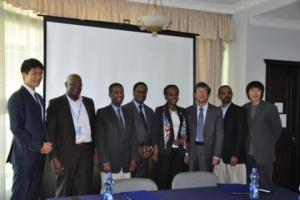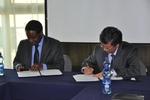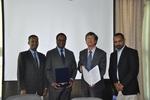KOICA and WHO Join Forces to Support Ebola Preparedness in Ethiopia
Addis Ababa. 29 December 2014 – Korea International Cooperation Agency (KOICA) and the World Health Organization Country Office for Ethiopia (WCO) joined forces in the effort to heighten Ebola virus disease (EDV) preparedness in Ethiopia. KOICA’s support to WHO will contribute to strengthening the capacity of the Ethiopian health system to prepare for Ebola in line with the country’s EVD outbreak preparedness plan.
The KOICA-WHO collaboration will help to ensure that health workers in Ethiopia will be adequately trained on EVD case management, surveillance and infection prevention precautions to timely detect, monitor and respond to an Ebola case if necessary. Six hundred health workers will be trained and close to 400 Personal Protective Equipment will be supplied to clinicians working with possible Ebola patients. Moreover, support to strengthen coordination and the sub-national EVD outbreak preparedness assessment will be carried out as part of the project.
“This support comes at a crucial time as we face the most important health challenge of 2014 and possibly also 2015,” Dr Pierre M’Pele-Kilebou, WHO Representative to Ethiopia, said at the signing ceremony held at the KOICA Office in Addis Ababa on 29 December. The project agreement is the first between KOICA and WHO in Ethiopia.
The Government of Ethiopia is implementing its EVD outbreak preparedness plan in collaboration with partners working under the national EVD technical working group lead by the Ethiopian Public Health Institute (EPHI), a special agency of the Federal Ministry of Health. EVD outbreak preparedness activities, including screening of incoming passengers at international airports and other international points of entry, setting up of an isolation unit, pre-positioning of Ebola PPE, preparation of relevant guidelines and protocols, orientation of health workers, raising of public awareness, and the establishment of an emergency hot line, coordination forums and isolation centres at sub national level, are on-going.
As of 24 December, a total of 19,497 confirmed, probable, and suspected cases of Ebola virus disease have been reported in four affected countries (Guinea, Liberia, Mali and Sierra Leone) and four previously affected countries (Nigeria, Senegal, Spain and the United States of America) with 7,588 deaths. The EVD outbreak was declared a Public Health Emergency of International Concern (PHEIC) by the WHO Director General under the International Health Regulations (IHR) on 8 August 2014. Accordingly, unaffected countries have been advised by the IHR emergency committee to establish surveillance, access to a qualified diagnostic laboratory for EVD, ensure basic infection prevention and control measures in health-care facilities, train healthcare workers and establish rapid response teams to investigate and manage EVD cases and their contacts.
For more information please contact
Dr Admas Tefera, Preparedness, Surveillance and Response Programme Coordinator, WHO Ethiopia; email: admast [at] who.int (admast[at]who[dot]int)
Ms Viivi Erkkila, Communication, Partnership and Resource Mobilization Officer, WHO Ethiopia; erkkilav [at] who.int (erkkilav[at]who[dot]int)
Photo: WHO Ethiopia/ Viivi Erkkila





